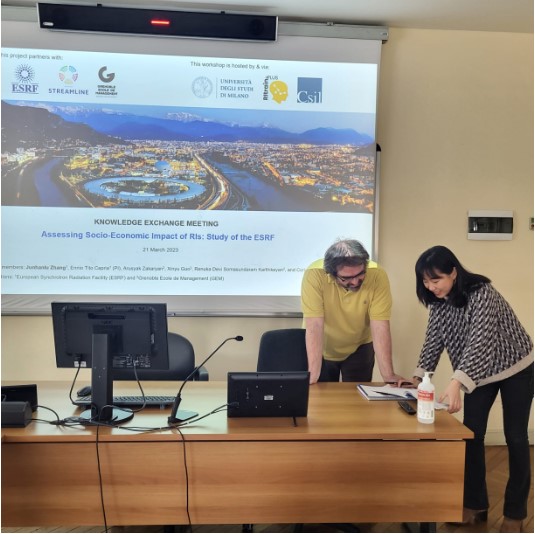The two-day staff exchange visit organised at the University of Milan brought together experts on assessing socio-economic impact of large-scale RIs. The visit consisted of a group meeting and several one-to-one exchange sessions. In this blog article, both visitor and host are sharing the takeaways and reflections from their experience of the staff exchange.

From the visitor:
Thanks to colleagues at the University of Milan, particularly Lorenzo Zirulia, the staff visit on 21 and 22 March 2023 was planned in a highly interactive and productive structure. In the afternoon of 21 March, I had the pleasure to attend a group meeting with six researchers from University of Milan and CSIL – Centre for Industrial Studies. The meeting started with my presentation on the on-going study on assessing socio-economic impact at the ESRF (European Synchrotron Radiation Facility) and was followed by valuable feedback from and discussions with the meeting participants. The economic and quantitative perspective is particularly interesting to large-scale RIs like ESRF. Specifically, University of Milan and CSIL share rich research experiences on Social Cost-Benefit Analysis with RIs including CERN, ALBA and ASI. The following day, I had the opportunity to learn more about the above-mentioned projects through four one-to-one meetings with the researchers who were involved.
Not only did the exchanges shed light on building assessment frameworks at a theoretical and methodological level, but also exploring practical tools to collect and analyse impact data and to present the research results. Considering the common challenges faced by researchers and impact practitioners in evaluating RIs’ impact beyond science, it is essential to initiate discussions and share lessons learned within the diverse and yet small research community. In my opinion, this staff exchange supported by the RItrainPlus project is one of those rare occasions. It allowed me to bring back new knowledge and ideas to my colleagues at the ESRF and our partnering research team at the Grenoble School of Management.
Junhanlu Zhang
Impact Analyst, Business Development Office
ESRF (European Synchrotron Radiation Facility)
From the host:
Over the years, the members of the Economics, Management and Quantitative Methods department at University of Milan (in collaboration with CSIL researchers) have developed significant competences in
the analysis of socio-economic impact of RIs and CFs. The group, led by Professor Massimo Florio, has been involved both in basic research and more applied activities directly involving RIs and CFs. In that respect, the opportunity of knowledge exchange with Junhanlu Zhang has surely represented an instance of fruitful collaboration outside the “ivory tower”. The group at University of Milan was represented, beyond me, by Valentina Morretta, Chiara Del Bo and Paolo Castelnovo (who recently moved to another institution); CSIL was represented by Silvia Vignetti, Francesco Giffoni and Jessica Catalano. Junhanlu brought to us a detailed knowledge of the actual working of the important RIs such as ESRF, complemented by her academic background in anthropology and intercultural studies, which is intriguing for a group that is mostly trained in economics. Thanks to her talk, and the individual meetings, we all have learnt a lot.
Lorenzo Zirulia
Associate Professor of Economics
University of Milan
